Filter by
# Debug Box
/var/www/htdocs/pustaka-digital/lib/SearchEngine/SearchBiblioEngine.php:688 "Search Engine Debug 🔎 🪲"
Engine Type ⚙️: "SLiMS\SearchEngine\SearchBiblioEngine"
SQL ⚙️: array:2 [ "count" => "select count(sb.biblio_id) from search_biblio as sb where sb.opac_hide=0 and (sb.call_number LIKE :callnumber)" "query" => "select sb.biblio_id, sb.title, sb.author, sb.topic, sb.image, sb.isbn_issn, sb.publisher, sb.publish_place, sb.publish_year, sb.labels, sb.input_date, sb.edition, sb.collation, sb.series_title, sb.call_number from search_biblio as sb where sb.opac_hide=0 and (sb.call_number LIKE :callnumber) order by sb.last_update desc limit 10 offset 140" ]
Bind Value ⚒️: array:1 [ ":callnumber" => "1%" ]
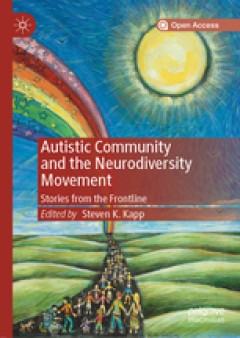
Autistic community and the neurodiversity movement
This open access book marks the first historical overview of the autism rights branch of the neurodiversity movement, describing the activities and rationales of key leaders in their own words since it organized into a unique community in 1992. Sandwiched by editorial chapters that include critical analysis, the book contains 19 chapters by 21 authors about the forming of the autistic community…
- Edition
- -
- ISBN/ISSN
- 9789811384370
- Collation
- 330 p.; 22 cm.
- Series Title
- -
- Call Number
- 155.142 AUT a
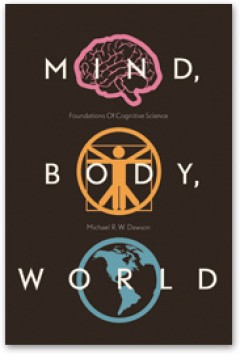
Mind, body, world : foundations of cognitive science
Cognitive science arose in the 1950s when it became apparent that a number of disciplines, including psychology, computer science, linguistics, and philosophy, were fragmenting. Perhaps owing to the fieldÕs immediate origins in cybernetics, as well as to the foundational assumption that cognition is information processing, cognitive science initially seemed more unified than psychology. Howeve…
- Edition
- -
- ISBN/ISSN
- 9781927356180
- Collation
- XV, 490 p.
- Series Title
- OPEL (Open Paths to Enriched Learning)
- Call Number
- 153 DAW m
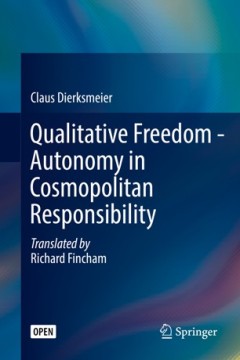
Qualitative freedom : autonomy in cosmopolitan responsibility
In the light of growing political and religious fundamentalism, this open access book defends the idea of freedom as paramount for the attempt to find common ethical ground in the age of globality. The book sets out to examine as yet unexhausted ways to boost the resilience of the principle of liberalism. Critically reviewing the last 200 years of the philosophy of freedom, it revises the princ…
- Edition
- -
- ISBN/ISSN
- 9783030047238
- Collation
- x, 365p. : ill.
- Series Title
- -
- Call Number
- 123.5 DIE Q

Augmented reality : reflections on Its contribution to knowledge formation
There is at present no publication specifically dedicated to analyzing the philosophical implications of augmented reality, especially regarding knowledge formation, which constitutes a fundamental trait of knowledge society. That is why this volume includes an analysis of the applications and implications of augmented reality. While applications cover diverse fields like psychopathology and ed…
- Edition
- -
- ISBN/ISSN
- 9783110497656
- Collation
- VII, 322 p.
- Series Title
- Berlin Studies in Knowledge Research, 11
- Call Number
- 100 AUG a
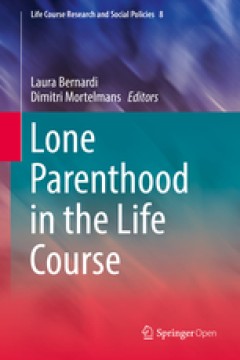
Lone parenthood in the life course
Lone parenthood is an increasing reality in the 21st century, reinforced by the diffusion of divorce and separation. This volume provides a comprehensive portrait of lone parenthood at the beginning of the XXI century from a life course perspective. The contributions included in this volume examine the dynamics of lone parenthood in the life course and explore the trajectories of lone parents i…
- Edition
- -
- ISBN/ISSN
- 9783319632933
- Collation
- 338 p.; 22 cm.
- Series Title
- Life Course Research and Social Policies; Volume 8
- Call Number
- 173 BER l

Moral reasoning at work : rethinking ethics in organizations
This book is open access under a CC-BY license. Moral dilemmas are a pervasive feature of working life. Moral Reasoning at Work offers a fresh perspective on how to live with them using ethics and moral psychology research. It argues that decision-makers must go beyond compliance and traditional approaches to ethics to prepare for moral dilemmas. The second edition has been updated with a rang…
- Edition
- -
- ISBN/ISSN
- 9783030151911
- Collation
- viii, 145p. : ill.
- Series Title
- -
- Call Number
- 174.4 KVA m

The ethics of vaccination
This open access book discusses individual, collective, and institutional responsibilities with regard to vaccination from the perspective of philosophy and public health ethics. It addresses the issue of what it means for a collective to be morally responsible for the realisation of herd immunity and what the implications of collective responsibility are for individual and institutional respon…
- Edition
- -
- ISBN/ISSN
- 9783030020682
- Collation
- xv, 126p. : ill.
- Series Title
- -
- Call Number
- 174.295372 GIU e
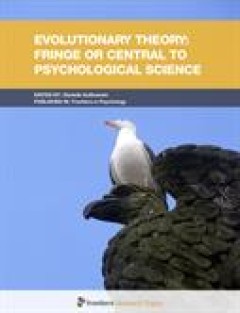
Evolutionary theory: fringe or central to psychological science
The computational theory of mind, which views the brain as an information processor that operates on cognitive representations, is central to modern cognitive psychology and is the dominant perspective from which brain function is conceptualized and studied. Evolutionary Psychology (EP) is the application of evolutionary theory to understanding human behaviour and cognition. Unlike other core P…
- Edition
- -
- ISBN/ISSN
- 9782889199204
- Collation
- 62 p.; 22 cm
- Series Title
- -
- Call Number
- 155.7 SUL e

Character, responsibility, and well-being: influences on mental health and co…
Character can be defined as self-aware knowledge that helps the individual to set goals, values and ethical principles (Cloninger, 2004). This meta-cognitive dimension of human personality involves ‘Theory of Mind’, and is positively related to measures of well-being, mental health, and constructive behavior patterns. Research from at least three different fields, cultural (Shweder, Much, M…
- Edition
- -
- ISBN/ISSN
- 9782889198221
- Collation
- 138 p.; 22 cm.
- Series Title
- -
- Call Number
- 155.2 ARC c

Why knowing what to do is not enough : a realistic perspective on self-reliance
This open access book sets out to explain the reasons for the gap between “knowing” and “doing” in view of self-reliance, which is more and more often expected of citizens. In today’s society, people are expected to take responsibility for their own lives and be self-reliant. This is no easy feat. They must be on constant high alert in areas of life such as health, work and personal f…
- Edition
- -
- ISBN/ISSN
- 9789402417258
- Collation
- ix, 157p. : ill.
- Series Title
- -
- Call Number
- 179.9 KEI w
 Computer Science, Information & General Works
Computer Science, Information & General Works  Philosophy & Psychology
Philosophy & Psychology  Religion
Religion  Social Sciences
Social Sciences  Language
Language  Pure Science
Pure Science  Applied Sciences
Applied Sciences  Art & Recreation
Art & Recreation  Literature
Literature  History & Geography
History & Geography